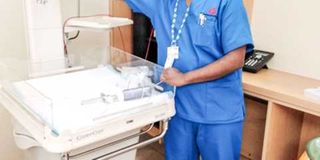Breaking News: Old Kijabe dam tragedy: Death toll rises to 45
Elias Karanja, the male midwife breaking down gender barriers

What you need to know:
- The term “midwife” is not gender based. It refers to specialists who offer antenatal care to pregnant women and their babies.
- The previous decade was about finding myself and of course, going back to school and finding contentment in midwifery.
Elias Karanja, 36, is a midwife at the Aga Khan University hospital. If he were to put a figure on the number of babies he has birthed, 400 would be on the lower end. He shares his journey and how his experiences have led him to appreciate women and womanhood.
Did someone inspire you to pursue midwifery?
No. Actually I had never heard anyone say that they were interested in the profession.
How then did you end up in it?
I was in my early twenties, working as a pharmacist, when my mother asked me if I was interested in going back to school to study nursing. I said yes. I wasn't very passionate about pharmacy and in any case, I earned peanuts from the job.
In 2007, at age 23, I enrolled at Pumwani Maternity College of Nursing and midwifery. I have been practising for the last nine years.
How do you introduce yourself in public?
Ah, that is still a challenge. Sometimes when I tell people that I am a midwife, they quickly correct me and say that I am a mid-husband. Others get so surprised, so I just introduce myself as a nurse. I have learnt that even the women I attend to find it difficult to refer me as a midwife. They prefer to call me a doctor.
Many are unaware that the term “midwife” is not gender based. It refers to specialists who offer antenatal care to pregnant women and their babies.
I'm curious, what inspired you to join this career path?
I thought of it as positive medicine. Yes, it is demanding and challenging, but during the birthing process, you help bring another life into the world. It is a speciality that in most cases has a happy ending. So many people were surprised when I chose this career, but my mother wasn't. She encouraged me.
At what point did you realise that you really loved your job?
When I first entered the labour ward while I was still a trainee and helped a mother through the process. After giving birth, she wore this big smile and radiant face and from that moment on, I knew that I was destined for midwifery.
What is the most difficult part of your job?
Handling complications. There's one instance when an expectant mother developed complications and we ended up losing her and her unborn baby. That was tough. It can be shocking and hard to deal with especially if they came to the hospital in good health.
What are you passionate about away from work?
Dairy farming. I keep dairy cows.
You are in your late 30s, how is life now compared to your 20s?
The previous decade was about finding myself and of course, going back to school and finding contentment in midwifery. Now, in my 30s, I have grown to appreciate the role that women play in the society. Labour pains are no joke! Also, I got married this decade.
What are some misconceptions about your career?
First, that it is only for females. I was shocked to find out that I was the only man who had opted to study midwifery in college. Who said that men can’t be good at it?
Second that a successful delivery can only be done by a doctor because midwives are incompetent. And lastly, that midwives have no formal education. On the contrary, they go to college for years and specialise in midwifery.
Your advice to young people about making career choices?
I would advise them to go for a course they are passionate about and also do some research to find out which professions are marketable. The reality in our country is that jobs are scarce. Also, when you find something that you enjoy, do it diligently as it may lead you to an even better opportunity.





